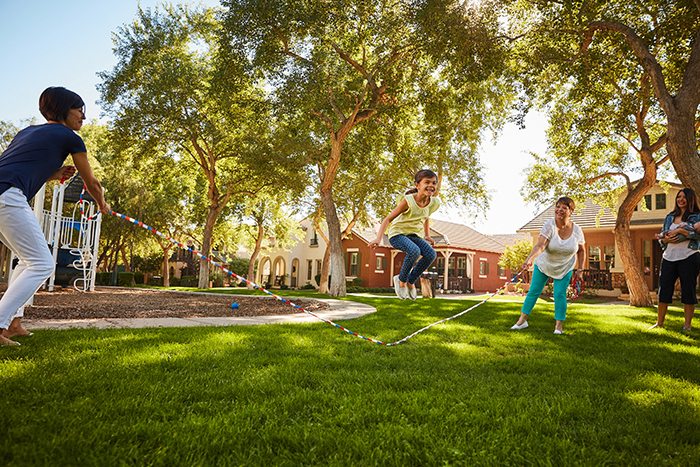Aside from location, space and affordability, community friendliness can be a deal-breaker when deciding where to live. Now, after almost two years of going through a pandemic, we have a renewed sense of appreciation for human connection. Having good neighbors can make our living experience more pleasant. They can create a sense of individual comfort as well as fostering bonds among the entire community. Whether through volunteering, throwing a block party, hanging out at the community center or engaging in conversations while at the local playground, living in a tight-knit neighborhood is associated with overall increased well-being.
READ ALSO: 6 best neighborhoods to work in Phoenix
Naturally, community friendliness differs, and some places do much better than others in cultivating strong neighborly connections. What are the cities that best embody the neighborly spirit? We surveyed close to 11,000 people from across the U.S. to find out. Overall, most Americans are happy with the people next door, as 67% of responses indicated that they appreciate their neighbors. Furthermore, by analyzing the responses, we’ve also been able to create a ranking of the most neighborly cities that takes the following into account:
• satisfaction with neighbors
• sense of community
• involvement in community activities
• willingness to recommend the neighborhood to others
According to our findings, Phoenix emerges as one of the most neighborly cities in the U.S. ranking 12th in our latest report.
• About 70% of Phoenix residents report being happy with their neighbors.
• The city’s spirit of civic engagement is also high, with 56% of people choosing to volunteer, donate to charity or clean up public spaces.
• 65% of Phoenix residents would recommend their neighborhood to other people too. And location is what 38% of respondents said they like best about their neighborhood.
• While Phoenix residents are generally happy with their neighborhood, 63.5% declared they plan to relocate in the near future, with 30% of them citing cost of living reasons.
Generally, big cities are regarded as less neighborly, as urban life is much more hectic and fast-paced than in smaller towns. But is this the case everywhere? We’ve looked at 30 mid-sized and big cities with populations over 280,000 to see where they stand in terms of neighbor friendliness. As it turns out, Indianapolis, Houston and Columbus top community neighborliness, with people more likely to live in friendly communities than in most other big cities.
Most Americans live in friendly communities, but the cost of living and the need to upgrade their home pushes them to move
According to our survey, most people are happy with their neighbors (67%). The Silent Generation & Gen Zers report a slightly higher satisfaction with their neighbors than the other age groups.
33% of respondents, however, report being dissatisfied with their neighbors. Millennials make up the largest chunk of those who aren’t happy with the people next door.
About 45% of people think there’s a strong sense of community in their neighborhood, while 30% are neutral on the subject. Of those who answered positively to getting involved in the community, Gen Zers are the most eager to take part in community activities. Having grown up exposed to current social issues, they’re more inclined to want to make a difference in the world. As it turns out, donating to organizations and supporting various causes comes naturally to Gen Zers.
Additionally, most people (56%) would recommend the neighborhood they live in. Baby Boomers (61%) are among the most enthusiastic about vouching for their neighborhood.
Even though they generally appreciate the communities they live in, most Americans (67%) say they plan to move away from their current neighborhood, citing cost of living as the main reason why. In fact, the cost of living has increased across the country in recent times. In Atlanta, GA, for example, where relocations are primarily driven by cost of living, it went up 7.9% year-over-year in November 2021, more than the national average (6.8%). Similarly, Dallas, TX, also experienced a 7.5% annual increase in the cost of living in November. In San Diego, CA, the cost of living increased by 6.6%.
The need to upgrade their home is the second reason pushing people to seek a new home elsewhere, followed by changes in family composition. Pursuing a new job and downsizing are also behind many people’s intention to relocate.
Location is the most sought-after neighborhood feature, while noise is the worst offender
Location, location, location. Real estate agents have been playing this on repeat for ages and it’s still key to assessing current housing choices. For survey respondents, location wins hands down as the thing they most love about their neighborhood. Gen Xers indicate a slightly stronger appreciation of their neighborhood’s position than other age groups.
A quiet environment comes second after location on the list of best neighborhood features, followed by parks and recreation areas, infrastructure and schools.
On the other hand, noise is what bugs people about their neighborhood across the board. Millennials declare themselves to be the most bothered by noise, followed by Gen Xers.
Indianapolis, IN, is the best place where neighbors are likely to hit it off
Most people desire neighborly communities. But how easy is it to find one that nurtures our need to feel connected? We’ve asked respondents to share their perception of friendliness in the communities they live in based on criteria such as satisfaction with their neighbors, their feel of the local sense of community, participation in community activities and their willingness to recommend their neighborhoods to others.

As it turns out, Indianapolis is the most neighborly place in the U.S. and there are a lot of reasons for that. Nearly three out of four residents - roughly 74% of locals - are happy with their neighbors. Additionally, Indy boasts a strong sense of community, with 58% of locals feeling satisfied with what their neighborhood has to offer. The city's spirit of civic engagement is also high, with 65% of people choosing to volunteer, donate to charity or clean up public spaces. More than half of Indy residents would recommend their neighborhood to other people too.
Among locals planning to change residence, changes in family composition are the main driver for moving. This varies by age group, however, as members of the Silent Generation are more eager to move, citing downsizing as the main reason behind this decision.
Following closely behind, Columbus, OH, comes off as a particularly neighborly US city. This is based on a combination of factors including neighbor satisfaction, sense of community, community involvement and how well recommended a city is.

Looking specifically at neighbor satisfaction, Columbus locals are the happiest, based on their self-reporting. Additionally, local neighborhoods seem to be united by a local desire to be involved and help out others in need, as 54% of Columbus residents claim they enjoy a strong sense of community. A great majority of Columbus residents report being involved in the neighborly act of giving, whether they volunteer or donate to charity.
People in Columbus take pride in their communities and wholeheartedly recommend living in their city – further proof of the Midwestern-nice atmosphere that’s prevalent here.
Of the Columbus respondents that declared they wish to move, Baby Boomers make up the largest chunk of potential movers. They cite the changes in family composition or downsizing as the main reasons for moving.
Houston is a place Mr. Rogers would happily call home thanks to the high reported rates of friendly neighbors. Overall, it ranks third among the 30 cities for community neighborliness. Locals are especially happy with those living next to them and take being neighborly seriously.

In fact, based on the responses to our survey, Houston boasts the strongest sense of community of any big city in the country. If you live in Houston, you’re likely to have neighbors who look out for you, whether they do you a favor now and again or they volunteer in the community.
Even though Houston is a happy place to live, not everybody wants to stay there. In fact, about three quarters of Houston residents expressed the intention to move elsewhere, whether to another neighborhood or to a new city. Gen Zers and Baby Boomers are the most intent on relocating, with the cost of living and a change of employment being the main reasons for wanting a new place to live.
In Nashville, TN, about 72% of people report being happy with their neighbors. And that’s no small feat. Perhaps they owe some of that high satisfaction with their friends across the fence to the great community bond the city boasts. In fact, Nashville shares the same spot with Houston on the podium for the strongest sense of community. With over 61% of locals claiming there’s a strong sense of community where they live, it’s no wonder Nashville has the largest share of residents (71%) recommending their neighborhood to other people. Perhaps Nashville should add “Please move here, we’re nice!” under their city welcome sign.

At the other end of the spectrum, Jacksonville, FL, scores way lower on neighborliness than other big cities in the U.S. It comes last among the 30 urban hubs we looked at in terms of how locals perceive the community atmosphere.
Many feel the sense of community as lacking in Jax and do little in terms of volunteering, donating to charity or simply helping out the community. A lot of Jacksonville residents plan to change their places of residence, citing changes in family composition as the primary reason to do so.
Los Angeles is also among the least neighborly cities in the U.S. Locals believe there isn’t a strong sense of community and over half of them don’t participate in community activities. Consequently, close to half of Angelenos wouldn’t recommend their neighborhood to others. Cost of living is the main reason most people in the City of Angels want to leave their current neighborhood.
You can check out the full list of the 30 cities we analyzed and check out how they compare in terms of neighborliness below:




